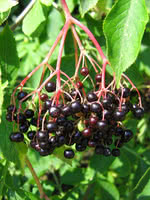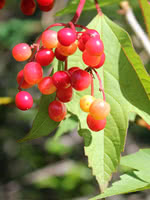Mon-Fri 9am - 5pm Mountain time
Black Elderberry vs Redwing Highbush Cranberry
Sambucus canadensis
Viburnum trilobum JN Select
NOT AVAILABLE THIS SEASON - MIGHT RETURN
NOT AVAILABLE THIS SEASON - MIGHT RETURN
Black Elderberry is a deciduous shrub native to eastern North America. You can plant this shrub in moist areas and it will help stabilize your soil. You can also use it on rural properties anywhere you'd use a lilac.
Black Elderberries are considered to be partially self-pollinating. So while they will still produce some berries without cross-pollination, planting with another variety will increase yields. Consider planting with Ranch Elderberry or Bob Gordon Elderberry.
Warning: the seeds, stems, leaves, roots, and uncooked berries of the Black Elderberry are poisonous to humans when eaten in quantity. You should cook the berries to make them safe for human consumption.
The Redwing Highbush Cranberry is a dense multi-stemmed shrub that blooms with white pinwheel shaped flowers in spring. It produces small, red, and edible berries in late summer. Its leaves are green, but the tips become more saturated with red throughout the season, and then turn a stunning crimson colour in the fall.
The Redwing Highbush Cranberry makes a good addition to any urban garden or hedge, and its berries are commonly used to liven up preserves with their tart flavor.
Black Elderberry Quick Facts
Redwing Highbush Cranberry Quick Facts
Toxicity: leaves, stems, and uncooked berries are poisonous to humans

